The Kansas City Commercial Real Estate Market

September 19, 2025
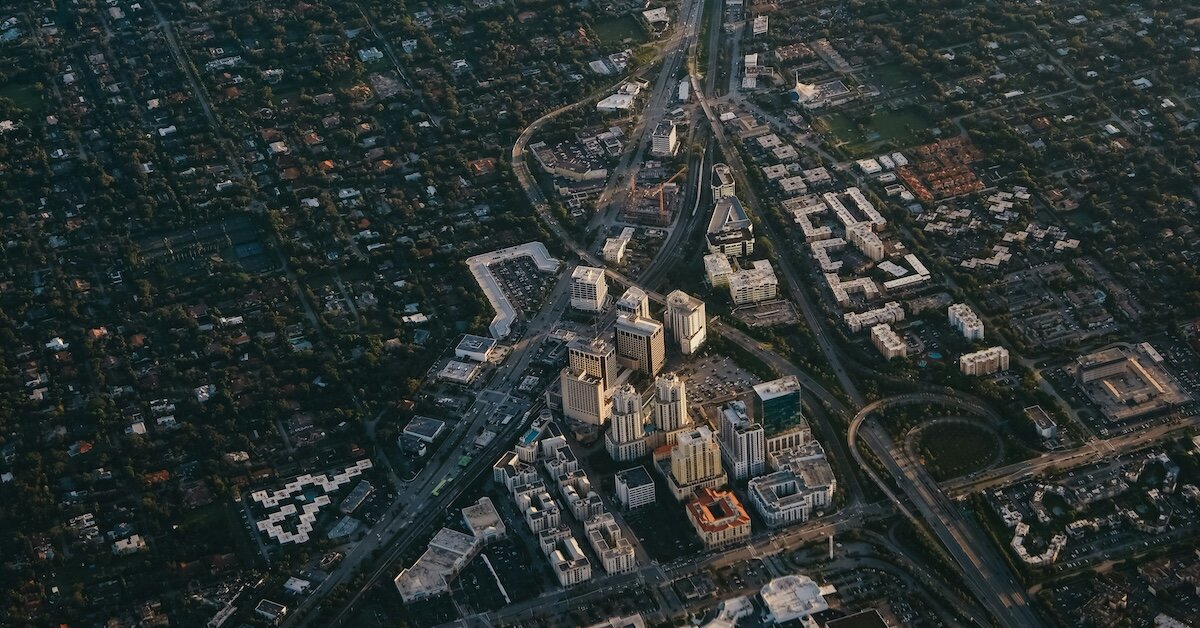
Key Takeaways
- Kansas City’s metro population of more than 2.2 million, combined with a median household income of $79,842 and over 40% of households earning $100,000 or more, underpins steady commercial real estate demand.
- The region’s industrial market is expanding with 7.4 million square feet under construction and major leases such as Church & Dwight (553,000 SF) and Smart Warehousing (548,000 SF) reinforcing strong logistics demand.
- Multifamily remains a bright spot, with rents averaging $1,405 per unit, vacancy at just 3.6%, and over 4,400 units under construction to meet rising demand.
- Retail shows resilience, with a 6% vacancy rate and sales volume exceeding $211 million over the past 12 months, even as leasing activity moderated in Q2 2025.
Kansas City has long been a crossroads of commerce, but in 2025 it’s also become one of the Midwest’s most dynamic real estate markets. Straddling the Missouri–Kansas border, the metro benefits from a central U.S. location that continues to draw logistics hubs, corporate expansions, and a steady flow of new residents. Its economy is diverse, anchored by healthcare, manufacturing, technology, and finance, and shows resilience even as national conditions fluctuate.
Crexi empowers brokers, investors, and tenants with the innovative tools they need to connect with the Kansas City market, streamlining every stage of the transaction process. Brokers across America have already partnered with Crexi to close more than $615 billion in CRE deals and market over $7 trillion in property value.
Today, Crexi continues to support the efforts of professionals across the Kansas City bi-state metropolitan area, including in Overland Park, Olathe, Lee’s Summit, and beyond.
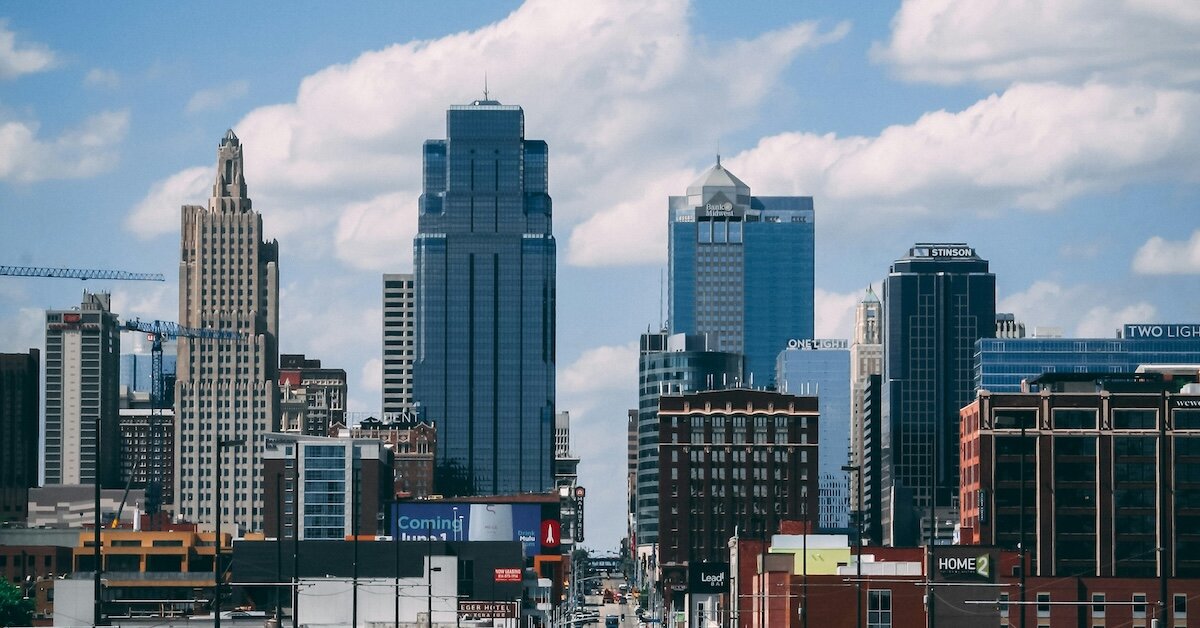
The State of Kansas City Commercial Real Estate Market
Sitting at the heart of the country, Kansas City has long been a crossroads for commerce, culture, and connectivity. Its central location makes it a natural hub for logistics and distribution, while a strong mix of industries - from tech and healthcare to manufacturing and finance - creates steady demand across property types. The city’s affordability compared to coastal metros continues to attract both businesses and residents, fueling a growing tenant base and investor interest.
Kansas City’s reputation for livability also plays a role. A thriving arts and food scene, pro-business climate, and ongoing downtown revitalization efforts make it an appealing place for companies to grow and for people to settle. Combined with infrastructure investments and its role as a regional anchor in the Midwest, the market offers investors a balance of stability and upside.
Kansas City Regional Breakdown
Kansas City’s metro area has grown into one of the Midwest’s most dynamic regions, balancing big-city resources with community-driven growth. With more than 2.2 million residents across both sides of the state line, the metro draws strength from its size, diversity, and steady in-migration. Suburbs like Overland Park, Olathe, and Lee’s Summit have expanded rapidly, fueled by strong schools, business relocations, and quality-of-life amenities.
The region’s workforce is also becoming younger and more affluent. A median age below the state average means a pipeline of talent for employers, while household incomes continue to climb, particularly among higher-earning families. This combination of growth, spending power, and demographics supports long-term demand for housing, retail, and mixed-use projects.
For investors, the result is a market where stable fundamentals meet emerging opportunities. As Kansas City invests in infrastructure, business recruitment, and redevelopment initiatives, the metro is positioned to remain a compelling destination for commercial real estate activity well into the future.
- Kansas City is home to over 510,000 people within city limits and more than 2.2 million within the larger Kansas City, MO-KS metropolitan area.
- The largest communities in the metro area include Kansas City, Overland Park, Olathe, Independence, and Lee’s Summit.
- Median age is 36.5, about 10% lower than the overall figure in the state (39.3 years).
- In the Kansas City metro area, per capita income is $43,678, while the median household income is $79,842.
- About 40% of the households have a median income of more than $100,000 annually.
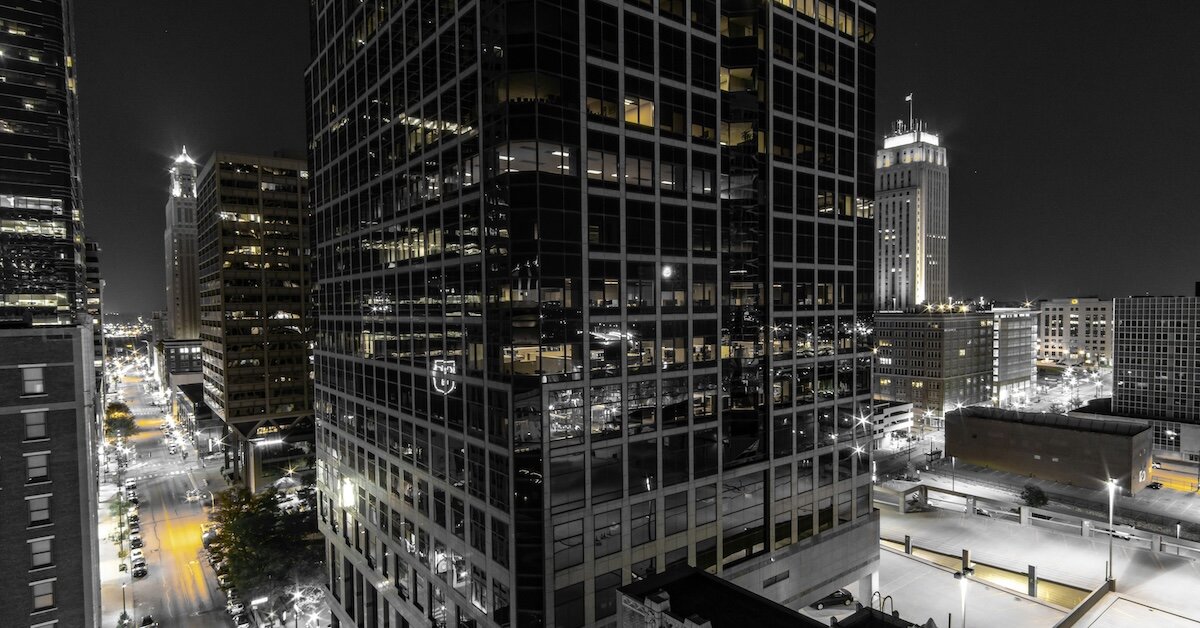
Kansas City Job Market
Kansas City’s economy has an impressive way of mixing the old with the new. Manufacturing and transportation still anchor the region, but industries like eCommerce, tech, and finance are steadily reshaping its future. The city’s central location keeps it a key hub for freight, while local universities and training programs feed a highly skilled workforce.
Big employers like T-Mobile, Hallmark, and H&R Block sit alongside startups and growing healthcare systems, giving the market both depth and variety. This blend of tradition and innovation helps Kansas City stay steady through cycles while opening new doors for long-term investment.
- The total real domestic product (GDP) for Kansas City, MO-KS is $152.8 billion, increasing by nearly 20% over the past ten years, based on St. Louis Federal Reserve (FRED) data.
- The unemployment rate is 4.4% (July 2025), with manufacturing, construction, and education and health services seeing the most significant 12-month growth.
- Key industries in Kansas City include transportation and distribution, eCommerce, manufacturing, technology, and finance
- Numerous notable organizations and companies operate within Kansas City, and major employers include the U.S. Government, T-Mobile, Hallmark Cards, H&R Block, JE Dunn Construction, and YRC Worldwide.
- In the Kansas City, MO-KS metro area, several major colleges and universities - such as the University of Missouri-Kansas City - contribute to a highly educated talent pool.
- Over 40% of residents hold a bachelor’s degree or advanced degree, which is about 10% higher than the US overall figure.
- The region operates a highly effective network of highways, roads, and rail lines, supporting both cargo and passenger travel. As a result, Kansas City is a major hub for freight.
- Kansas City is served by the Kansas City International Airport, situated about 15 miles northwest of Downtown.
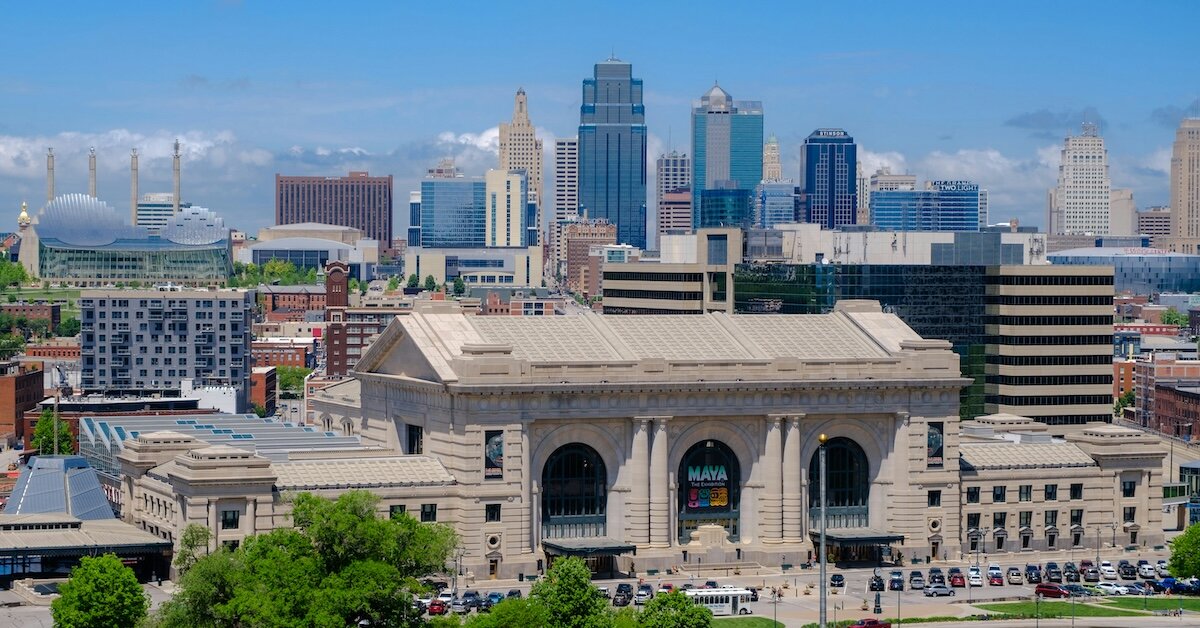
Kansas City Industrial Market
Kansas City’s industrial market is holding its ground in 2025, even as national activity cools. Absorption has been strong, boosted by large build-to-suit projects that continue to reshape the region’s logistics and manufacturing base. The highly anticipated Panasonic plant in De Soto, along with other megadeals, underscores the metro’s role as a hub for advanced manufacturing and distribution.
At the same time, speculative construction is slowly returning, hinting at renewed confidence from developers looking ahead to 2026 and beyond. Going forward, Kansas City remains a prime location for firms that need scale, speed, and central access to the rest of the country.
Market overview (Cushman & Wakefield Q2 2025)
- Inventory: 273,195,621 SF
- Vacancy rate: 6.1%
- Absorption: 7,721,878 SF (YTD)
- Deliveries: 5,331,138 SF
- Under construction: 7,423,992 SF
- Key leases by tenant: Church & Dwigth (553,000), Smart Warehousing (548,333 SF), Origin Point Brands (325,651 SF)
- Largest submarkets: Johnson County, Jackson County, Wyandotte County
Crexi Insights
These are the most recent Kansas City industrial lease and sales trends from Crexi Insights (as of September 2025):
For Lease (active)
- Asking rate/SqFt (median): $20 per year
- Median SqFt/listing: 2,769
- Days on market: 305
- Total listings on Crexi: 925
For Sale (active)
- Median asking price: $1.6million
- Price/SqFt: $135
- Median SqFt/listing: 17,200
- Days on market: 224
- Total listings on Crexi: 67
Sales Comps (past 12 months)
- Median sold price: $906,300
- Sold price/SqFt: $77
- Total sales volume: $79.5 million
- Median SqFt sold/transaction: 9,578
- Total SqFt sold: 1.7 million
- Days on market (median): 784
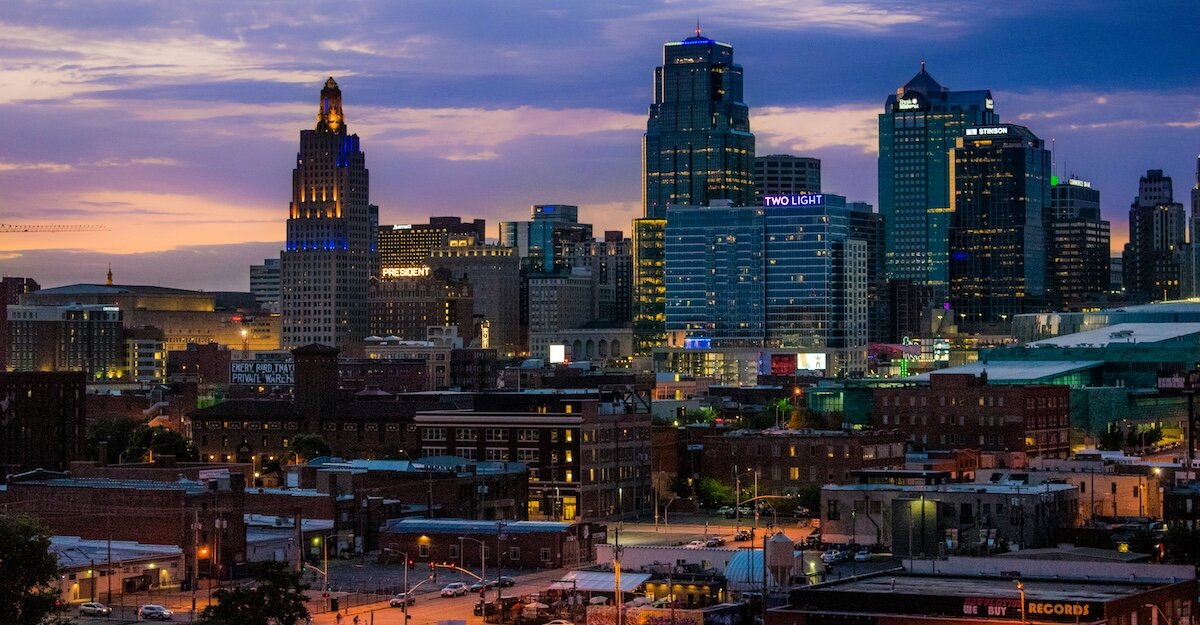
Kansas City Office Market
The Kansas City office market is in the middle of a transition in 2025. Big moves by companies like Fiserv are signaling confidence in the region, even as overall vacancy stays elevated. The flight to quality continues, with tenants choosing newer, more efficient spaces and landlords investing heavily to upgrade existing buildings.
Large-scale projects, such as the Aspiria campus lease, highlight the city’s ability to attract major employers and high-paying jobs, helping reshape the long-term outlook. While the market is still working through its challenges, Kansas City’s mix of corporate relocations, steady leasing activity, and strategic investment is laying the groundwork for a healthier, more competitive office sector in the years ahead.
Market overview (Cushman & Wakefield Q2 2025)
- Inventory: 52,898,046 SF
- Vacancy rate: 20.7%
- Net absorption: 432,109 SF (YTD)
- Leasing activity: 1,491,823 SF
- Key leases by tenant: Fiserv (421,454 SF), Lathrop GPM (47,179 SF), RBC (23,813 SF)
- Largest submarkets: South Johnson County, Downtown, North Johnson County
Crexi Insights
For the latest updates on the office market in Kansas City, turn to Crexi Insights. Here is the detailed information on the recent sales and leasing trends as of September 2025.
For Lease (active)
- Asking rate/SqFt (median): $21 per year
- Median SqFt/listing: 2,320 SF
- Days on market: 322
- Total listings on Crexi: 644 spaces
For Sale (active)
- Median asking price: $1.5 million
- Price/SqFt: $100
- Asking cap rate: 8%
- Days on market: 185
- Total listings on Crexi: 85
Sales Comps (past 12 months)
- Median sold price: $682,000
- Sold price/SqFt: $118
- Total sales volume: $31.2 million
- Median SqFt sold/transaction: 5,875 SF
- Days on market (median): 138
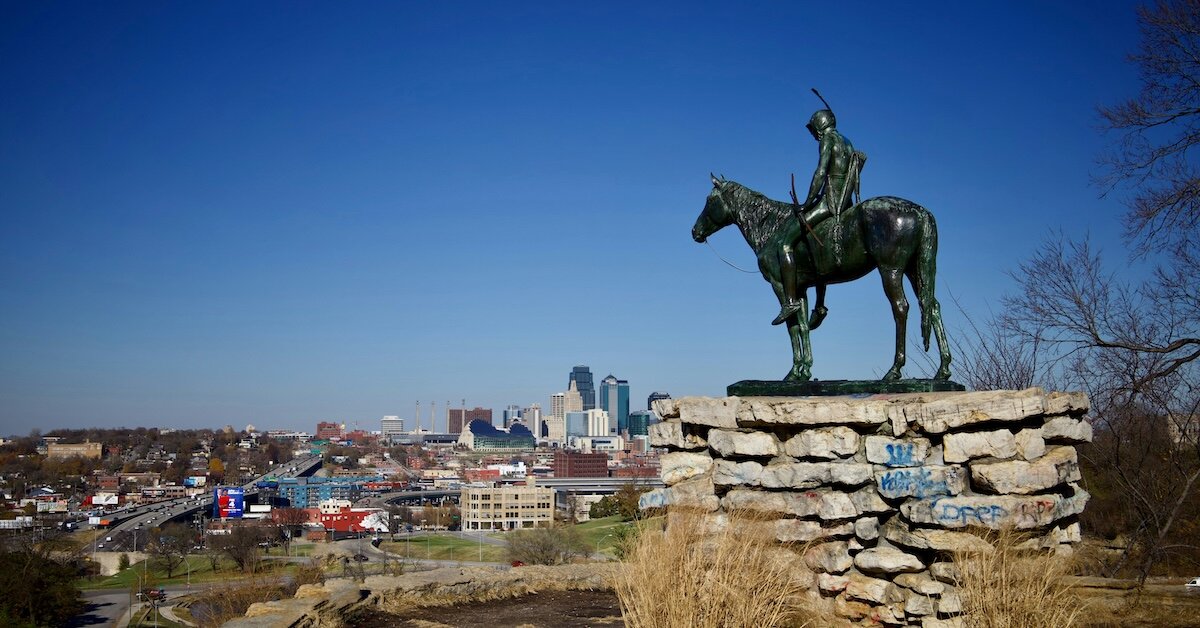
Kansas City Retail Market
Kansas City’s retail sector in 2025 is showing signs of adjustment after a period of steady growth. While overall demand for retail space remains healthy, the market saw a dip in absorption this past quarter, reflecting a slower pace of new leasing. Deliveries have been limited, and only a small amount of new space is under construction, keeping supply in check.
Even so, established shopping corridors and mixed-use districts continue to draw tenants, and well-located centers remain competitive. Looking ahead, the market’s stability will likely depend on how quickly consumer spending and tenant expansion regain momentum through the second half of the year.
Market overview (Cushman & Wakefield U.S. Shopping Center Reports Q2 2025)
- Inventory: 52,722,196 SF
- Vacancy rate: 6%
- Net absorption: -260,600 SF (Q2 2025)
- Under construction: 63,421 SF
- Deliveries: 18,045 SF (YTD)
Crexi Insights
Kansas City retail lease and sales trends from Crexi Insights (as of September 2025):
For Lease (active)
- Asking rate/SqFt (median): $20 per year
- Median SqFt/listing: 2,719 SF
- Days on market: 365
- Total listings on Crexi: 352 spaces
For Sale (active)
- Median asking price: $1.1 million
- Price/SqFt: $185
- Asking cap rate: 6.5%
- Days on market: 236
- Total listings on Crexi: 119
Sales Comps (past 12 months)
- Median sold price: $650,000
- Sold price/SqFt: $138
- Total sales volume: $211.2 million
- Sold cap rate: 8.1%
- Median SqFt sold/transaction: 4,128 SF
- Days on market (median): 266
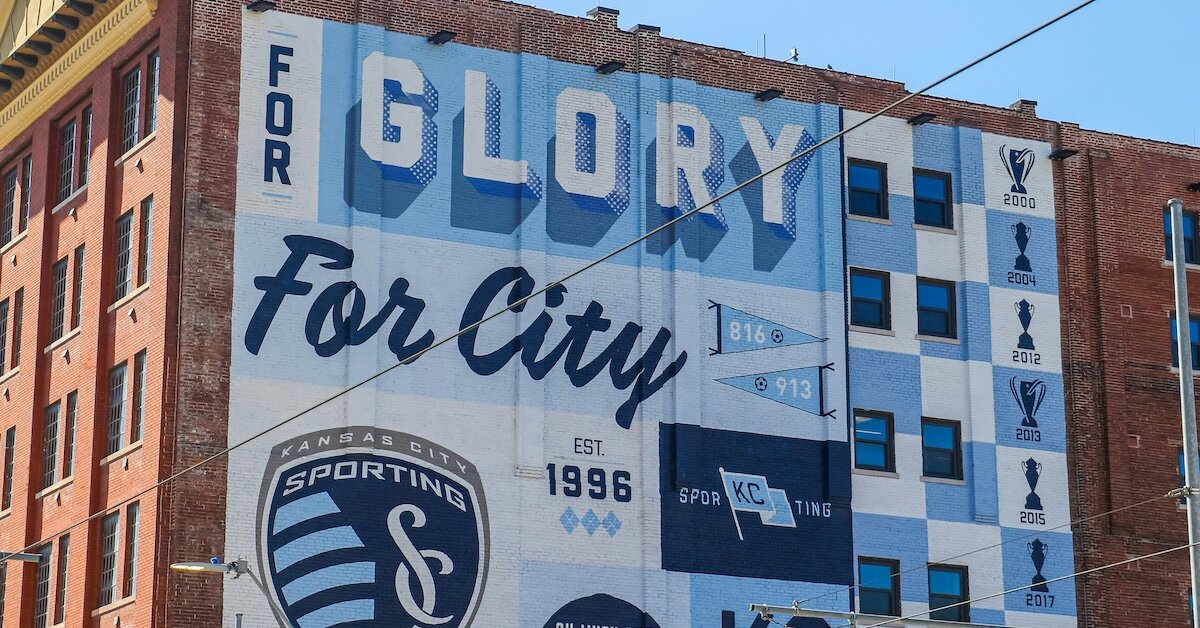
Kansas City Multifamily Market
Kansas City’s multifamily sector is proving to be one of the metro’s steadiest real estate performers in 2025. After years of sharp rent spikes nationally, this market has settled into a more sustainable rhythm, with rents holding firm and vacancy levels among the lowest in the region.
Demand continues to outpace deliveries, showing that renters are still drawn to the city’s balance of affordability, job opportunities, and quality of life. Developers remain active, with thousands of units underway in Central Kansas City and surrounding submarkets, including several high-profile projects slated for completion in 2025 and 2026.
Market overview (Cushman & Wakefield Q2 2025)
- Total housing units: 969,534 units (metro area total)
- Multi-unit inventory: 188,351 units
- Vacancy rate: 3.6%
- Average rent per unit: $1,405
- Absorption: 3,656 units (YTD)
- Unit delivered: 2,200
- Units under construction: 4,457
- Largest submarkets: Central Kansas City, Clay County, Independence/East Kansas City
- Key development projects: Arrive KC (360 units; est. completion Q2 2026), EPC Real Estate (281 units; est. completion Q2 2026), Alto Apartments (280 units; Q3 2025)
Crexi Insights
Here are the most recent Kansas City multifamily market insights from Crexi (as of September 2025):
For Sale (active)
- Median asking price: $397,000
- Price/SqFt: $96
- Price/Unit: $100,800
- Asking cap rate: 8.1%
- Days on market: 143
- Total listings on Crexi: 82
Sales Comps (past 12 months)
- Median sold price: $386,100
- Sold price/SqFt: $129
- Sold price/unit: $118,900
- Total sales volume: $221.7 million
- Sold cap rate: 10.3%
- Total SqFt sold: 1.4 million
- Days on market (median): 89
Get more in-depth Kansas City market data with Crexi Intelligence.









